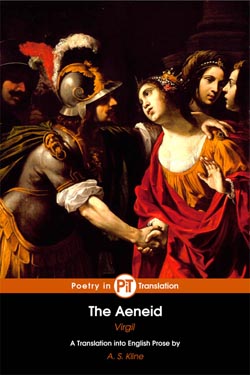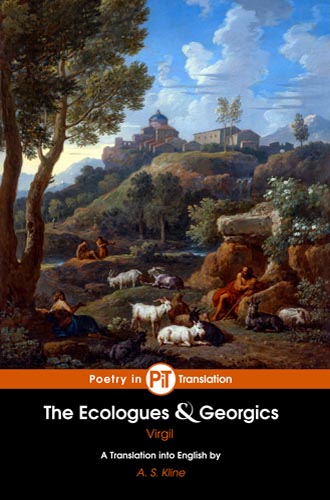Virgil
The Aeneid
The epic poem of Aeneas of Troy, and the origins of Rome.

- Browse below
- Download
- Buy This Book
Book I: The Trojans Reach Carthage
Book II: The Fall of Troy
Book III: The Trojans Sail for Italy
Book IV: The Tragedy of Dido
Book V: The Funeral Games
Book VI: The Visit to the Underworld
Book VII: War in Latium
Book VIII: The Site of Rome
Book IX: The Siege
Book X: The Relief and Battle
Book XI: Councils of War
Book XII: The Death of Turnus
About This Work
In the Aeneid, Virgil retells, and partially invents, the story of Aeneas, the son of Anchises and the goddess Venus-Aphrodite who, fleeing the ruins of Troy carrying his father on his shoulders, and bearing his household gods, journeyed to Italy. In doing so Virgil consciously creates the national epic of Rome, posits a semi-divine lineage for the Imperial house of Augustus Caesar, and provides an origin for the Roman people. Full of powerful and evocative passages, for example those describing Aeneas’ desertion of Dido, Queen of Carthage, and those describing his visit to the Underworld, the Aeneid ensured Virgil’s literary fame.
Aeneas embodies the Roman virtues of steadfastness, and loyalty, coupled with a sense of destiny, which Virgil reinforces with pseudo-prophetic elements implying that the founding of Rome was a fated consequence of the destruction of Troy. From a literary viewpoint, Aeneas provides continuity between the epics of Greece, where he appears as a character in the Iliad, and the epics of Rome where he is portrayed as an ancestor of Romulus, Rome’s founder.
Virgil’s work had a wide influence on later Roman epic and on European literature in general. Dante in particular employed Virgil as guide to his journey through the Inferno and Purgatory of the Divine Comedy, seeing him as a proponent of Empire, a master of the poetic tradition, and a prophet of the advent of Christianity.
About the Author
Virgil (Publius Vergilius Maro, also called Vergil) was born near Mantua, in Cisalpine Gaul, in 70BC. He is known for three major works of Latin literature, the Eclogues or pastoral poems, the Georgics a treatise on farming, and his epic the Aeneid. He benefited greatly from the enlightened patronage of Maecenas, an ally, friend and political advisor to the Emperor Augustus. Virgil dedicated the Georgics to Maecenas. According to tradition, Virgil visited Greece in order to revise the Aeneid which he wrote between 29 and 19BC. After meeting Augustus in Athens and deciding to return home, he caught a fever and, after crossing to Italy, died in Brundisium (Brindisi) in September of the latter year, his ashes reputedly being interred on the site of his villa near Naples, where a burial vault is shown today as Virgil’s Tomb. The Aeneid was published in full after his death, on the orders of Augustus.
Also See:
Virgil - The Eclogues and Georgics, translated by A. S. Kline
Virgil’s Eclogues, also known as the Bucolics, is his earliest major work, comprising ten pastoral poems. Adapting Greek bucolic traditions, the text features herdsmen engaging in dialogues and competitive singing within pastoral scenes, reflecting both resistance and adaptation to societal changes and varied romantic experiences.
The Georgics, written by Virgil in 29 BCE, is a poetic treatise in four books on the agricultural practices of its time. Despite its pastoral subject, the poem is imbued with thematic and existential contrasts. Serving as Virgil’s intermediary piece between the Eclogues and the Aeneid, it synthesises a range of earlier works.
Translated by A. S. Kline © Copyright 2002 All Rights Reserved
This work may be freely reproduced, stored and transmitted, electronically or otherwise, for any non-commercial purpose. Conditions and Exceptions apply.
Last Modified 17th January 2008
